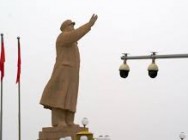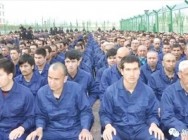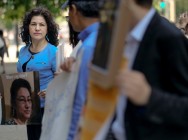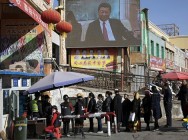Last Minute

- CHINA RELATIONSEAST TURKESTAN PROBLEM AND TURKEY
- FRONTLINE China Undercover
- Elimination of “Uyghur Counter-Revolutionary Officials” in Academic Fields—Exact Quotes Translated from a Mandarin Audio File
- In Push for Trade Deal, Trump Administration Shelves Sanctions Over China’s Crackdown on Uighurs
- Dalai Lama’s 60th Anniversary Symposium: İlshat Hassan speech in English and Chinese
- Uyghur Detainees from Xinjiang ‘Placed in Nearly Every Prison’ in Shandong Province
- Shahrezad Ghayrat, Unrepresented Women
- Uighur Americans Speak Against China’s Internment Camps. Their Relatives Disappear.
- Rozinisa: The true story of the Uyghur girls in the prison
- The Chinese Government Must Account for the Disappearance of the 10+ Million Uyghurs

-

CHINA RELATIONSEAST TURKESTAN PROBLEM AND TURKEY
-

FRONTLINE China Undercover
-

Elimination of “Uyghur Counter-Revolutionary Officials” in Academic Fields—Exact Quotes Translated from a Mandarin Audio File
-

In Push for Trade Deal, Trump Administration Shelves Sanctions Over China’s Crackdown on Uighurs
-

Dalai Lama’s 60th Anniversary Symposium: İlshat Hassan speech in English and Chinese
-

Uyghur Detainees from Xinjiang ‘Placed in Nearly Every Prison’ in Shandong Province
Township in Xinjiang Keeps ‘Personal Archive’ of Uyghurs Who Flee Region
Authorities in an ethnic Uyghur township in northwestern China’s Xinjiang region have created files to track the identities and whereabouts of suspect persons and others who have left the area, sometimes simply to find work in other parts of China, one of those responsible for maintaining the system said.
The system was set up last year in Yengi’eriq township in Aksu (in Chinese, Akesu) prefecture’s Awat (Awati) county, Alim Rahman, a member of the township’s “stability work team” told RFA’s Uyghur Service in an interview.
Uyghurs whose names appear in the files include suspected “religious extremists,” “[ethnic] separatists,” and “dealers in illegal drugs,” Alim said, adding that records have been compiled on everyone known to have left the township “since the 1990s.”
Alim’s own work focuses on Uyghurs who have fled the township’s Lengger village, he said.
Many of these are persons wanted by the police, including some who managed to escape before being taken into custody, he said.
Others had left to find a place where they could practice their Islamic religious beliefs in safety or to “seek a better life,” he said.
“Most of them have disappeared since then, and are hiding somewhere in [China’s] inner provinces or in the cities. Others have escaped to foreign countries by illegally crossing the borders,” he said.
Personal archive
Security officials have now begun to set up a “personal archive” for each person who has fled, Alim said.
“We try to investigate their full name, age, occupation, educational background, identification number, and blood type,” he said.
Also added to the files are the suspect’s original home address, family members’ names, and anything known about their current activities and situation—including telephone numbers, bank accounts, and social media addresses, Alim said.
“Of course, this isn’t easy work for us,” Alim said.
“”We pressure their parents and family members, and require them to inform us if they receive any call from our ‘target.’”
“Some of the parents know where their children are, though,” he said. “But they conceal this from us, so we have to find some way to make them tell us what they know.”
In one case, a notice posted on a popular Uyghur website that falsely alerted a suspect to his father’s “impending death,” brought the man out of hiding, Alim said.
“He came back to our village last month, and township police released his father,” who had been held as a hostage against his son’s return, he said.
County police then held and questioned the man for several months, but found no evidence against him of “illegal activities or behavior,” he said.
“He was recently released, but our township government has not allowed him to move away from the village again.”
‘Most wanted’
In another case, Yengi’eriq authorities discovered that a young Uyghur woman who had fled the township two years before had been taken into custody by police in China’s southern province of Guangxi after attempting to illegally cross the border with Vietnam.
Shirin’gul, 19, was among those “most wanted” by the Yengi’eriq stability maintenance team, Alim said.
“She was involved in ‘illegal religious activities’ as a teenager, and after she graduated from high school she was very active in spreading illegal religious materials and literature promoting Holy War over the Internet and social media.”
Shirin’gul escaped from Lengger village at the end of 2013 and quickly disappeared, Alim said.
“Her case gave us a huge headache, because we didn’t get any information about her for almost two years,” he said.
Rights groups accuse the Chinese authorities of heavy-handed rule in Xinjiang, including violent police raids on Uyghur households, restrictions on Islamic practices, and curbs on the culture and language of the Uyghur people.
China has vowed to crack down on what it calls the “three evils” of terrorism, separatism, and religious extremism in Xinjiang, but experts outside China say Beijing has exaggerated the threat from Uyghur separatists, and that domestic policies are responsible for an upsurge in violence that has left hundreds dead since 2012.
Reported by Eset Sulaiman for RFA’s Uyghur Service. Translated by Eset Sulaiman. Written in English by Richard Finney.
http://www.rfa.org/english/news/uyghur/archive-10192015173027.html
RELATED NEWS












